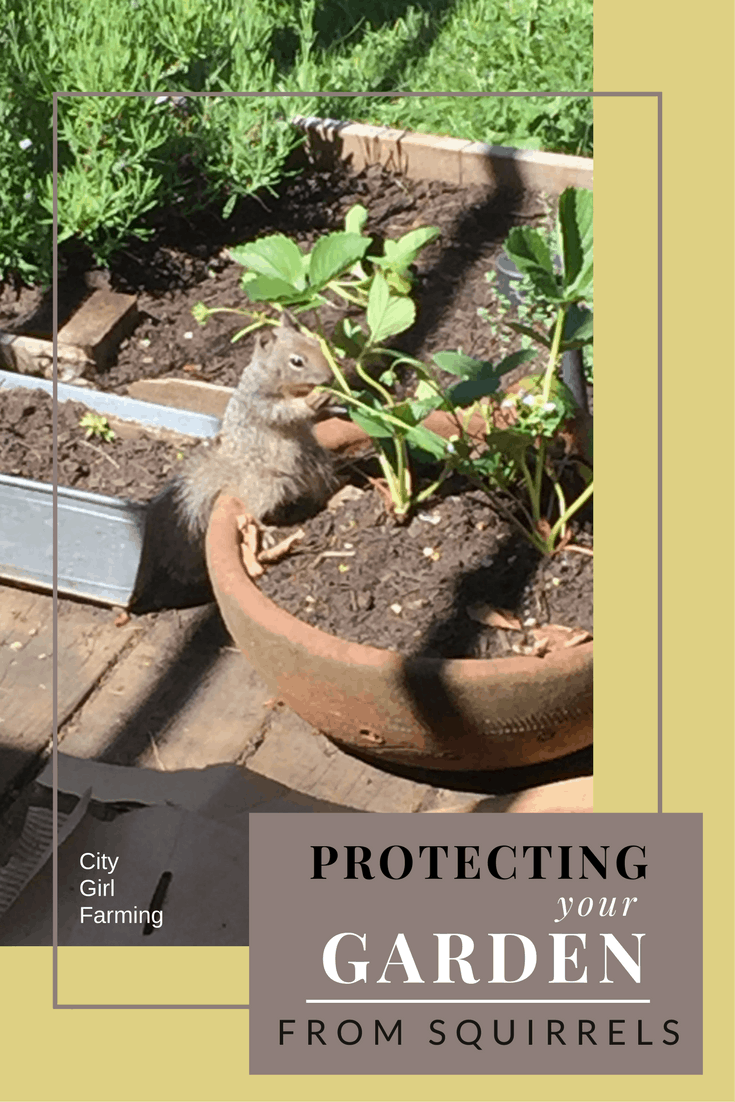To protect your garden from squirrels, use physical barriers like netting or fencing. Employ natural repellents such as peppermint oil.
Squirrels can wreak havoc on your garden, digging up plants and stealing produce. These small, agile creatures are persistent and can be challenging to deter. Implementing effective strategies is crucial for safeguarding your garden. Physical barriers like netting or fencing can keep them out.
Natural repellents, such as peppermint oil, can also discourage them. Regularly monitoring your garden and addressing squirrel activity promptly will help maintain its health. Combining these methods will provide a comprehensive defense against squirrels, ensuring your garden thrives.

Credit: inmyownstyle.com
Identifying Squirrel Damage
Protecting your garden from squirrels begins with knowing the signs of their presence. Identifying squirrel damage helps you take the right action to save your plants. This section will guide you on recognizing common squirrel activities in your garden.
Signs Of Squirrel Presence
Squirrels often leave clear signs. Look for these indicators:
- Footprints: Small, four-toed prints in soft soil.
- Droppings: Small, dark, and pellet-shaped.
- Chewed Nuts and Fruits: Bits of shells and peels scattered around.
- Digging: Small holes in the soil or lawn.
Common Garden Damage
Squirrels can cause various types of damage to your garden. Here are common issues:
| Type of Damage | Description |
|---|---|
| Plant Damage | Chewed leaves, stems, and flowers. |
| Fruit and Vegetable Theft | Missing or partially eaten produce. |
| Bulb Digging | Uprooted or missing bulbs. |
| Container Damage | Knocked over or disturbed pots and containers. |
Early detection of these signs can help you manage squirrel activity effectively. Use barriers and deterrents to protect your garden from further damage.
Squirrel Deterrents
Squirrels can wreak havoc in your garden. They dig up plants, steal seeds, and cause other damage. To protect your garden, you need effective squirrel deterrents. You can use natural repellents or commercial products to keep these pesky critters away.
Natural Repellents
Natural repellents are safe for your garden and the environment. They often use smells and tastes that squirrels dislike.
- Hot Pepper Spray: Mix water, dish soap, and hot pepper flakes. Spray it on plants. Squirrels hate the spicy taste.
- Garlic Spray: Blend garlic cloves with water and dish soap. Spray it around the garden. The strong smell repels squirrels.
- Vinegar: Soak cloths in vinegar and place them around your garden. The smell keeps squirrels away.
Commercial Products
Commercial products can be more potent and long-lasting. These are specially designed to deter squirrels.
- Repellent Granules: Scatter these around your garden. They contain ingredients that squirrels dislike.
- Sonic Repellers: These devices emit sounds that scare squirrels. Place them around your garden.
- Spray Repellents: These sprays contain chemicals that deter squirrels. Use them on plants and garden areas.
Below is a table summarizing some common natural and commercial squirrel deterrents:
| Type | Method |
|---|---|
| Natural | Hot Pepper Spray, Garlic Spray, Vinegar |
| Commercial | Repellent Granules, Sonic Repellers, Spray Repellents |
Physical Barriers
Protecting your garden from squirrels can be challenging. Physical barriers are effective and straightforward solutions. These barriers prevent squirrels from accessing your precious plants. Here, we explore various fencing options and netting solutions to safeguard your garden.
Fencing Options
Fencing is one of the most reliable methods. A proper fence can keep squirrels away from your garden. Below are some effective fencing options:
- Chicken Wire: Chicken wire is inexpensive and easy to install. It works well to keep squirrels out.
- Electric Fences: These fences deliver a mild shock. They deter squirrels without harming them.
- Hardware Cloth: Hardware cloth is strong and durable. It is ideal for creating a sturdy barrier.
- Plastic Mesh Fencing: This type of fencing is lightweight and easy to handle. It’s also effective in keeping squirrels out.
| Fencing Type | Pros | Cons |
|---|---|---|
| Chicken Wire | Inexpensive, Easy to Install | Less Durable |
| Electric Fences | Effective, Reusable | Requires Power Source |
| Hardware Cloth | Strong, Long-lasting | More Expensive |
| Plastic Mesh Fencing | Lightweight, Easy to Handle | Can be Less Effective |
Netting Solutions
Netting provides an additional layer of protection. It is especially useful for covering specific plants or areas. Here are some netting solutions:
- Bird Netting: Bird netting is lightweight and flexible. It can cover plants or trees effectively.
- Garden Netting: This netting is designed specifically for gardens. It is durable and resistant to tearing.
- Mesh Bags: Use mesh bags to cover individual fruits or vegetables. They prevent squirrels from nibbling on your produce.
Using both fencing and netting together provides excellent protection. Ensure your garden remains squirrel-free and your plants thrive.
:max_bytes(150000):strip_icc()/__opt__aboutcom__coeus__resources__content_migration__mnn__images__2016__04__tomato-cages-0912c9e41fd44b63ad460cf09f950756.jpg)
Credit: www.treehugger.com
Scare Tactics
Squirrels can be a menace to your garden. Scare tactics are effective in keeping them away. These methods use noise and visuals to frighten squirrels. This section will cover noise makers and visual deterrents.
Noise Makers
Noise makers can scare squirrels away from your garden. Here are some effective options:
- Wind chimes: Hang wind chimes around your garden. Their sound can startle squirrels.
- Ultrasonic devices: These gadgets emit sounds only animals can hear. They are annoying to squirrels.
- Radios: Place a radio in the garden. Set it to a talk station. The human voices can scare squirrels.
- Motion-activated devices: These gadgets produce noise when they detect movement. They are perfect for startling squirrels.
Visual Deterrents
Visual deterrents can keep squirrels at bay. Use these items to scare them:
- Reflective tape: Hang reflective tape around your garden. The light reflections can confuse and scare squirrels.
- Fake predators: Place statues of owls or hawks in your garden. Squirrels will think predators are nearby.
- Garden pinwheels: These spin and reflect light. Squirrels find them unsettling.
- Motion-activated sprinklers: These devices spray water when they detect movement. Squirrels will be frightened by the sudden spray.
Using noise makers and visual deterrents together can be very effective. Your garden will be a less attractive place for squirrels.
Plant Choices
Choosing the right plants can help protect your garden from squirrels. Certain plants can deter these pesky critters. Let’s explore some effective plant choices.
Squirrel-resistant Plants
Some plants are naturally unappealing to squirrels. These plants can help you keep your garden safe.
- Marigolds: Their strong scent repels squirrels.
- Daffodils: These flowers are toxic to squirrels.
- Alliums: Squirrels dislike their onion-like smell.
- Hyacinths: These bulbs deter squirrels with their scent and taste.
- Mint: The strong aroma of mint keeps squirrels away.
Companion Planting
Companion planting involves growing certain plants together. This method can help deter squirrels and protect your garden.
| Plant | Companion | Benefit |
|---|---|---|
| Tomatoes | Marigolds | Repels squirrels |
| Roses | Lavender | Deters pests |
| Carrots | Onions | Repels squirrels |
Using these plant combinations can enhance your garden’s defense. This method also improves plant health and growth.
Feeding Alternatives
Feeding alternatives can effectively keep squirrels away from your garden. By providing other food sources, you can protect your plants and flowers. Let’s explore some creative feeding alternatives to ensure your garden stays safe.
Decoy Feeding Stations
Create decoy feeding stations to distract squirrels from your garden. Place these stations far from your plants.
- Use bird feeders filled with squirrel-friendly seeds.
- Install stations with nuts and corn.
- Ensure stations are easily accessible to squirrels.
Decoy stations keep squirrels busy elsewhere. This protects your garden from their hungry paws.
Squirrel Feeders
Introduce squirrel feeders to your yard. Squirrel feeders can divert their attention from your plants.
- Choose feeders designed specifically for squirrels.
- Fill them with peanuts, sunflower seeds, or corn.
- Place feeders at a distance from your garden.
Squirrel feeders can be fun and effective. They reduce the need for squirrels to raid your garden for food.
Garden Maintenance
Keeping your garden free from squirrels requires regular garden maintenance. By focusing on cleanliness and securing compost, you can deter these persistent invaders.
Cleaning Up
Squirrels love messy gardens. To make your garden less attractive, follow these tips:
- Remove fallen fruits and nuts daily.
- Rake leaves and debris often.
- Trim overgrown plants and bushes.
Use a table to schedule your cleaning tasks:
| Task | Frequency |
|---|---|
| Remove fallen fruits | Daily |
| Rake leaves | Weekly |
| Trim plants | Monthly |
Securing Compost
Squirrels are attracted to compost bins. Secure your compost by:
- Using a compost bin with a tight lid.
- Placing heavy rocks on the lid.
- Keeping the bin away from trees and fences.
A simple solution is to use a compost tumbler. It keeps the compost secure and easy to manage.

Credit: citygirlfarming.com
Humane Trapping
Squirrels can be quite the nuisance in gardens. One effective method to control them is humane trapping. This method ensures the animals are not harmed and can be released safely. Let’s explore the types of traps and the protocols for releasing these critters back into the wild.
Trap Types
There are different types of humane traps available. Each has its own advantages:
- Live Cage Traps: These traps are designed to catch squirrels without causing injury. They usually have a bait section and a spring door.
- Single-Door Traps: These traps have one door that closes behind the squirrel. They are easy to set up and effective.
- Multiple-Catch Traps: These traps can catch more than one squirrel at a time. They are useful if you have many squirrels in your garden.
Release Protocols
Once a squirrel is trapped, it’s important to release it safe
Frequently Asked Questions
How Can I Keep Squirrels Out Of My Garden?
To keep squirrels out, use physical barriers like netting or fencing. Plant squirrel-repellent plants such as mint or marigolds. You can also use squirrel repellents available in stores.
What Are Natural Squirrel Repellents?
Natural squirrel repellents include hot pepper spray, garlic, and vinegar. These can be sprayed around your garden to deter squirrels. You can also use predator urine or essential oils like peppermint.
Do Ultrasonic Devices Work For Squirrels?
Ultrasonic devices can help deter squirrels by emitting high-frequency sounds. These sounds are annoying to squirrels but are inaudible to humans. However, their effectiveness can vary.
Can Squirrels Damage My Garden Plants?
Yes, squirrels can cause significant damage to garden plants. They dig up bulbs, eat fruits, and gnaw on tree bark. Protecting your garden is essential to prevent such damage.
Conclusion
Protecting your garden from squirrels is essential for healthy plants. Use fencing, repellents, and proper garden maintenance. These strategies ensure your garden thrives without squirrel damage. Consistent efforts will keep these pests at bay. Enjoy a beautiful and productive garden year-round.
Implement these tips and watch your garden flourish.
